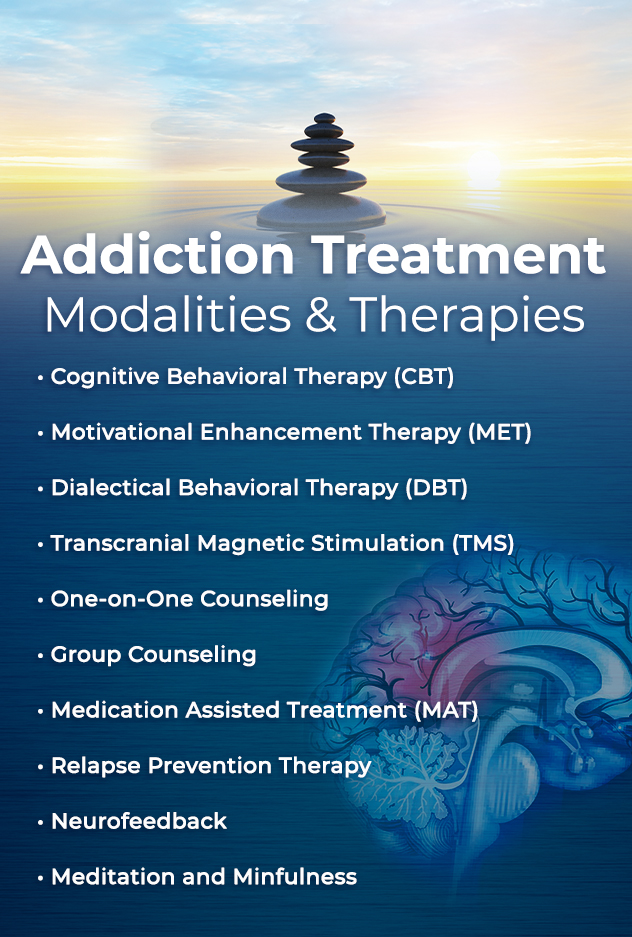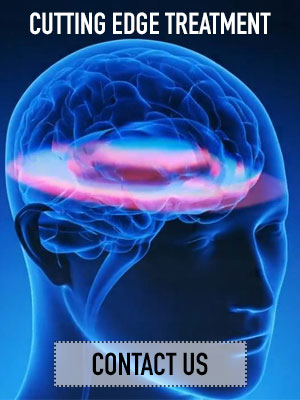Leading Cognitive Neuroscience Addiction Treatment at Pure Recovery
At Pure Recovery, we specialize in cognitive neuroscience addiction treatment, offering cutting-edge non-12-step recovery programs. Our programs focus on overcoming not only drug and alcohol addiction but also addressing related challenges such as traumatic brain injuries, chronic pain, mood disorders, and dual diagnoses.
We employ evidence-based addiction treatment modalities and therapies proven to yield the most successful results. Our commitment to holistic and comprehensive treatment plans ensures each client receives personalized care designed to meet their unique needs, thereby enhancing their chances of a happier, healthier life in recovery.
Key elements of our addiction recovery approach include:
- Cognitive Behavioral Therapy (CBT): Addresses patterns of thought that negatively affect behavior and emotions.
- Motivational Enhancement Therapy (MET): Helps individuals harness their internal motivation to change their behavior.
- Dialectical Behavioral Therapy (DBT): Focuses on improving emotional and cognitive regulation through a set of therapeutic skills.
- Transcranial Magnetic Stimulation Therapy (TMS): A noninvasive procedure that uses magnetic fields to stimulate nerve cells in the brain to improve symptoms of depression and addiction.
- Personalized one-on-one counseling and interactive group counseling sessions.
- Medication Assisted Treatment (MAT): Uses medication, along with counseling and behavioral therapies, to treat substance use disorders.
- Relapse Prevention Therapy: Equips clients with the skills to prevent and manage relapse.
In addition to these core therapies, Pure Recovery provides a range of other evidence-based, holistic therapies designed to support clients throughout their recovery journey, ensuring they are equipped to succeed and thrive post-treatment.
Table of Contents
Motivational Enhancement Therapy (MET)
Motivational Enhancement Therapy (MET), often effectively combined with Cognitive Behavioral Therapy (CBT), is designed to help clients, overcome any hesitation or doubts about recovering from addiction. Unlike traditional therapies that follow a step-by-step recovery process, MET focuses on helping patients harness their own personal motivation. This is achieved through a deeper understanding of the root causes of their addiction, empowering them to make more informed and healthier choices moving forward.
MET serves as a crucial motivational tool especially useful for athletes who may be uncertain about whether they face an addiction problem or need to seek treatment. By aligning MET and CBT for addiction, athletes can develop a strong foundation for recovery, learning to leverage their inherent drive for excellence in overcoming their challenges.
Understanding and addressing the unique pressures faced by our clients in behavioral therapy for addiction, MET provides tailored strategies that resonate with their competitive nature and high-performance lifestyle. This approach not only aids in recovery but also enhances their ability to make strategic addiction recovery choices that benefit their overall health and careers.
Call Us: (833) 441-0754 | Email Us
Dialectical Behavioral Therapy (DBT) Addiction Recovery

Dialectical Behavioral Therapy (DBT), initially developed as a treatment for psychiatric disorders such as borderline personality disorder, has evolved into a robust, evidence-based approach effective in treating addiction. DBT helps individuals learn to interrupt and manage damaging patterns of thought that contribute to substance abuse and addiction.
Often, DBT is most effective when paired with Cognitive Behavioral Therapy (CBT), both of which enhance patients’ abilities to recognize destructive thinking and implement positive behavioral changes.
Incorporating DBT for addiction recovery provides clients the tools necessary to manage their responses to stress and emotional challenges effectively. This is crucial in not only overcoming addiction but also in preventing relapse, as clients often face unique pressures and expectations that can trigger destructive behaviors.
Our programs at Pure Recovery focus on leveraging DBT and CBT for athletes to foster resilience and facilitate a sustainable return to peak performance. Through behavioral therapies for addiction, athletes are equipped to make significant changes in their thought processes and behaviors, leading to improved mental health and recovery outcomes.
Transcranial Magnetic Stimulation (TMS Therapy) in Addiction Recovery for Athletes
Transcranial Magnetic Stimulation, or TMS Therapy, is a groundbreaking, noninvasive brain stimulation technique that targets key areas of the brain, such as the prefrontal cortex—which regulates mood—and the limbic system, which is crucial for managing cravings. TMS Therapy aims to stimulate nerve cells to relieve symptoms of depression, anxiety, and other mental health issues that contribute to addictive behaviors.
TMS has become a valuable option for patients, including athletes, who have not found success with traditional anti-depressants or have experienced complications from such medications. Originally developed for treatment-resistant depression, TMS now shows significant promise in addiction treatment, providing a new avenue for those seeking innovative therapies in their recovery journey.
TMS for addiction treatment offers a non-pharmacological approach to managing cravings and underlying mental health issues, making it an attractive option for clients concerned about the effects of medications on physical performance and overall health. This therapy is particularly relevant for athletes, as it addresses both the physical and psychological components of recovery without the side effects associated with conventional drugs.
One-on-One Counseling (Individual Counseling Therapy) at Pure Recovery Luxury Rehab Center
At Pure Recovery, our licensed and board-certified therapists are dedicated to supporting our clients in a private, non-judgmental setting through One-on-One Addiction Counseling. This personalized approach is particularly beneficial for athletes, who may require discretion and specialized attention to address the unique pressures they face.
Individual Counseling Therapy for Athletes is an essential tool in our arsenal, helping clients explore and identify key areas in their lives that drive unwanted behaviors. These sessions are critical not just for tackling issues related to addiction but also for developing coping strategies that enhance personal and professional life.
Each counseling session is tailored to meet the individual’s unique needs, allowing our therapists to develop customized addiction treatment plans that are effective and sustainable. The personal nature of private counseling for addiction also helps to build trust between our clients and therapists, a fundamental component of a successful recovery process.
Whether you’re struggling with substance abuse or looking for ways to manage the stressors associated with athletic careers, our personalized recovery approaches ensure that you receive the most effective care designed just for you. Our goal is to facilitate a lasting recovery, empowering you to regain control over your life in a supportive and non-judgmental counseling environment.
Group Counseling in Non-12-Step Recovery Programs
At our luxury rehab facility, our Non-12-Step Group Counseling sessions provide a vital platform for athletes to realize that addiction is a disease that can affect anyone, regardless of their background or professional status. These group therapy sessions offer a unique opportunity for participants to hear others’ experiences and challenges, which can significantly broaden their understanding of their own addiction struggles.
Initially, group therapy for clients can be daunting, as many are hesitant to share personal stories outside of individual counseling. However, as they advance in their recovery journey, many will find that group meetings become a favorite part of their treatment. These sessions help them connect with others facing similar challenges, enhancing their engagement and commitment to recovery.
The benefits of group counseling include fostering a sense of community and support, crucial elements for those in recovery. Connecting through group therapy provides a network of peer support that empowers individuals to share openly and learn from each other, making significant strides in their recovery process.
Engaging in group therapy not only helps individuals feel less isolated but also aids in developing new coping skills and perspectives on addiction management, making it an invaluable component of the recovery journey.
Medication Assisted Treatment (MAT)
Medication Assisted Treatment (MAT) is recognized for its effectiveness in helping clients move safely and comfortably through the challenging phases of withdrawal and detox from alcohol and other drugs, under the careful supervision of a physician. This method is crucial for managing the physical aspects of substance dependency, particularly in the high-pressure environments athletes and high-stress professions often face.
MAT includes advanced medications that significantly ease cravings associated with opioid dependence, and others that aid in helping individuals with alcohol dependency either avoid drinking or reduce the frequency and intensity of relapse periods. These treatments are especially beneficial for athletes who need to maintain physical health and performance while managing recovery.
Recognized by leading medical and health organizations, Medication Assisted Treatment is now recommended as the most effective form of treatment for those looking to overcome the grips of the opioid epidemic. For clients, this endorsement underscores the safety and efficacy of MAT in handling addiction, ensuring they receive the most reliable and health-conscious care.
Effective MAT programs provide a comprehensive approach that not only focuses on the acute phase of detox but also supports long-term recovery plans, significantly reducing the chance of relapse. By integrating physician-monitored withdrawal processes and utilizing medications that are shown to help manage dependencies, MAT helps athletes maintain their careers and personal lives without interruption.
Relapse Prevention Therapy at Pure Recovery Luxury Rehab Center
Relapse Prevention Therapy is an essential element of Pure Recovery’s comprehensive approach to addiction treatment, specifically designed to meet the needs of our clients. This therapy helps clients develop robust strategies for managing cravings and triggers, and identifying and avoiding high-risk situations that could lead to a relapse.
Clients learn to recognize the early signs of the relapse process before it occurs, enabling them to proactively intervene on their own behalf. This awareness is crucial, as it allows individuals to seek additional help if needed and maintain the momentum of their recovery journey.
Relapse Prevention Therapy equips clients with the tools necessary to stay on track with recovery, even under the unique pressures and challenges of their careers. By understanding and implementing effective relapse intervention strategies, athletes can continue to perform at their best, both on and off the field, while safeguarding their health and well-being.
Diverse and Scientific Holistic Therapies at Pure Recovery
At Pure Recovery, we extend beyond traditional addiction treatment modalities by incorporating a range of scientific addiction therapies and holistic treatments. Our approach combines advanced scientific methods with personalized wellness medicine to improve brain health and overall well-being, ensuring our clients achieve the most successful recovery possible.
Among the specialized therapies we offer are:
- 3D Neurofeedback, an advanced technique that helps optimize brain function.
- Meditation and Mindfulness, essential practices for mental clarity and stress reduction.
- 3D Brain Mapping, which provides detailed insights into brain activity and areas needing attention.
- Eye Movement Desensitization and Reprocessing (EMDR), available by request, to help process and recover from traumatic experiences.
- Biofeedback Cognitive Programs and Behavior Modification Techniques to improve mental health and behavioral responses.
- Comprehensive Trauma Therapy, crucial for addressing underlying issues that contribute to addiction.
- Acupuncture, Yoga, and Massage Therapy, which support physical and mental relaxation and recovery.
- Hydrotherapy and Chiropractic Care, which aid in physical health and alignment, enhancing overall recovery experiences.
Each therapy at Pure Recovery is selected to support the holistic healing of the brain, mind, and body, tailored to the high demands and specific challenges faced by high-stress professions and athletes in their professional and personal lives. By offering these integrative health approaches, we ensure a thorough and effective recovery process, focusing on long-term health and optimal performance.
To learn more about our specialized Addiction Treatment Modalities and Therapies located throughout the United States, we encourage you to reach out to us. Our program is specifically tailored to meet the needs of those facing the challenges of addiction. Call us toll-free at (833) 441-0754 to speak directly with an addiction specialist who understands the unique pressures and needs of recovery.


